12/2024: APL Rising Stars! Our paper “Extreme sensitivity of higher order interatomic force constants and thermal conductivity to the energy surface roughness of exchange-correlation functionals” has been selected in the 2024 APL Rising Stars virtual collection! This highly selective collection consists of 57 total papers, just under 2% of the journal’s annual total volume.
11/2024: Rising Star Award! Prof. Feng received the 2024 ASME Rising Star of Mechanical Engineering Award!
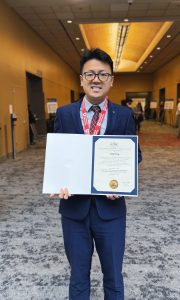
11/2024: Student award! Hao Zhou won the best presentation award and the second place best poster award at the IMECE conference in Portland!
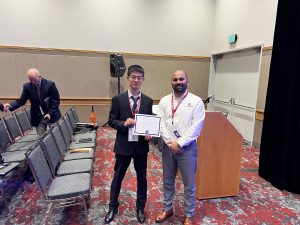
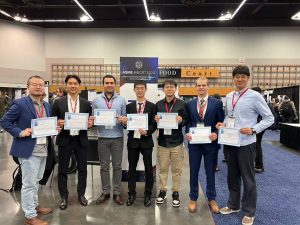
9/2024: Guest Lecture! Dr. Zilong Hua from Idaho National Lab gave a guest lecture at the University of Utah!
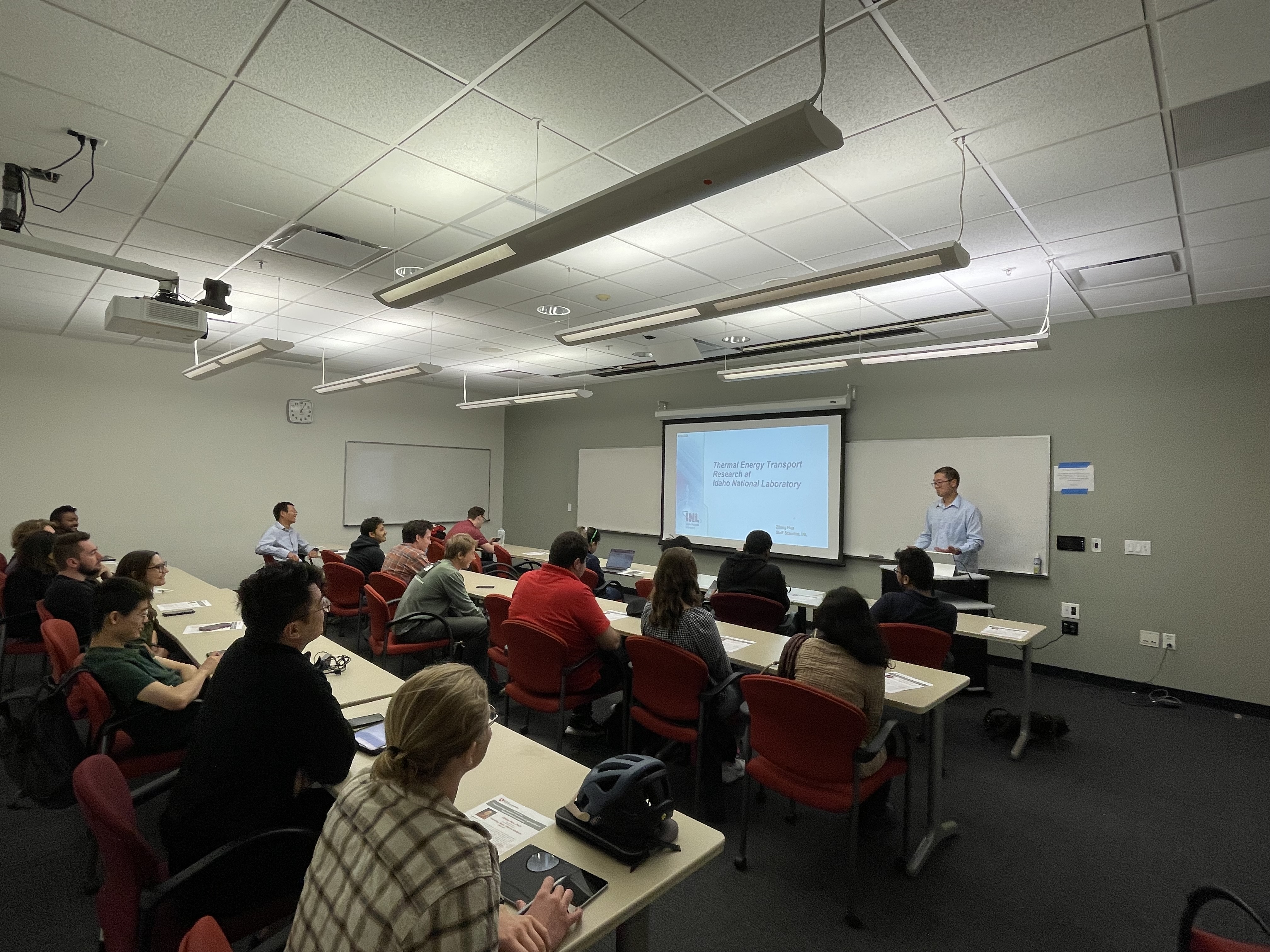
8/2024: Assistant Professor of the Year Award! Prof. Feng received the Assistant Professor of the Year Award in the Department of Mechanical Engineering!
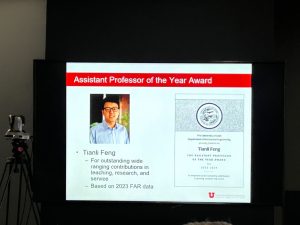

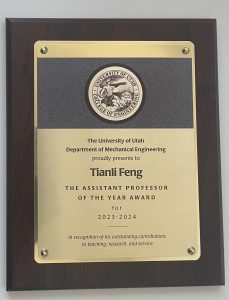
7/2024: Best Presentation Award! Jacob Crossley received a Best Presentation Award at the Summer Heat Transfer Conference!

5/2024: Graduate Student of the Year Award! Janak Tiwari received the 2024 Graduate Student of The Year Award in the TFES Division of the Department of Mechanical Engineering! Congratulations to Janak!
1/2024: NSF CAREER Award! Prof. Feng received the 2024 NSF CAREER Award! See [University of Utah News]
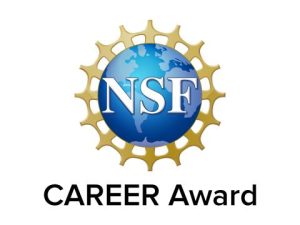
11/2023: Engineering Day! Prof. Feng gave three lectures to high school students in Utah to help them understand the significance of heat transfer in cutting-edge applications. The students were well engaged.
11/2023: Featured Article! Our recent paper [H. Zhou, S. Zhou, Z. Hua, K. Bawane, T. Feng*, “Extreme sensitivity of higher-order interatomic force constants and thermal conductivity to the energy surface roughness of exchange-correlation functionals”, Appl. Phys. Lett. 123, 192201 (2023).] [Link] [PDF] was selected as a Featured Article by Applied Physics Letters! Congratulations, Hao!
11/2023: Students Best Presentation Award. Proud of my PhD students, Janak Tiwari and Hao Zhou, for their dedication and hard work. Congratulations to Hao for winning the Best Presentation Award at the IMECE 2023 conference, and kudos to Janak for doing a fabulous job as well.
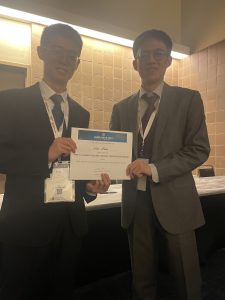
10/2023: Highly Cited Paper! The paper [Feng and X. Ruan, “Quantum mechanical prediction of four-phonon scattering rates and reduced thermal conductivity of solids”, Physical Review B 93, 045202 (2016)] was honored the Clarivate Web of Science Highly Cited Paper in Physics in 2023!
09/2023: K-12 Education! Prof. Feng gave two 1-hour science lectures on the topic of “Control The Heat” to the high school students at Farmington Bay Youth Center, Farmington, Utah. The students were well engaged and asked many interesting questions!
08/2023: Department newsletter! The 2023 University of Utah Department Newsletter highlights Dr. Feng’s contributions. See [2023 Newsletter]
06/2023: Summer Research Internship! Two high school students joined our group for a summer research internship! Welcome, Audrey and Adam!
06/2023: Student Championship! The senior students mentored by Dr. Rao, Dr. Shiri, and Dr. Feng won the 2023 IEEE/EPS ASME K16 Student Heat Sink Design Challenge! Congratulations, Xander Lehnardt, Chandler Elliott, Preston Bodily, Taylor Cox, and Zachary Julien! This is a part of the capstone course.
06/2023: Ralph E. Powe Junior Faculty Enhancement Award! Prof. Feng received the 2023 Ralph E. Powe Junior Faculty Enhancement Award! This award is given to 35 junior faculty members in total, selected from more than 150 universities across five disciplines: Engineering and Applied Science, Life Sciences, Mathematics/Computer Sciences, Physical Sciences, Policy, Management, or Education.

05/2023: Brillouin Medal! Prof. Feng, together with Prof. Xiulin Ruan, received the 2023 Brillouin Medal, which is awarded every 2 years to 1-3 people who make significant contributions to phonon research. Prof. Ruan will deliver a Brillouin talk at Phononics 2023 in Manchester, UK (June 12-16, 2023). See [University of Utah News] [Phononics News] [Purdue University News] [2023 Department Newsletter Feng]

All Brillouin Medal Recipients (2013-2023):
- 2013: Ping Sheng, Che Ting Chan, and Zhiyu Yang, “for their discovery of the concept of a ‘locally resonant acoustic metamaterial’ and related contributions”
- 2015: John H. Page, Zhengyou Liu, and Suxia Yang, “for their first demonstration of focusing of acoustic waves by negative refraction in a flat phononic crystal”
- 2017: Giulio Casati, Baowen Li, and Lei Wang, “for their invention of the phononic rectifier, diode, and transistor and related contributions”
- 2019: Alexander A. Balandin, “for his discovery of unique phonon properties of graphene, and contributions to the development of graphene thermal management applications”
- 2021: Andrea Alù, Romain Fleury, and Dimitrios Sounas, “for their demonstration of non-reciprocal and topological phonon transport at the macroscopic scale”
- 2023: Xiulin Ruan and Tianli Feng, “for their formulation of four-phonon scattering theory and associated computational studies”
02/2023: K-12 Education! Prof. Feng gave three 80-min science lectures on the topic of “Control The Heat” to the high school students at the Decker Lake Youth Center, West Valley City, Utah. The students were well engaged and asked many interesting questions!
11/2022: Engineering Day! Prof. Feng gave three 40-min lectures to high school students in Utah to help them understand what research in nanoscale heat transfer looks like. The students were well engaged.
11/2022: Student defense! Rui Xie has successfully defended his thesis M.S. in our group. Congratulations to Rui!
5/2022: Research News! Thermal Conductivity at Ultra-High Temperatures! Check out our recent research news! [University of Utah News]
4/2022: Research highlight! Our recent work “Reduced anharmonic phonon scattering cross-section slows the decrease of thermal conductivity with temperature” was accepted by Materials Today Physics!! This work is expected to generate a broad impact on thermal conductivity prediction at high temperatures!
12/2021: Invited Talk! Prof. Feng gave an online invited talk at the Chongqing University Condensed Matter and Quantum Physics Conference.
11/2021: Invited Talk! Prof. Feng gave a 3.5-hour invited tutorial talk “Four-phonon scattering: a critical process determining thermal and radiative properties” at the Materials Research Society (MRS) Fall 2021 Conference in Boston, MA.
11/2021: Engineering Day! Prof. Feng gave two 40-min lecture talks to the high school students in Utah to help them understand what the research in engineering looks like. The students were well engaged.
11/2021: BYU visit! Prof. Feng visited Brigham Young University (BYU) and gave an introduction to his research to the undergraduate students at BYU. Students showed strong interest!
10/2021: K-12 Education! Prof. Feng gave a 50-min lecture on the topic of “Control The Heat” to the high school students at the Millcreek Youth Center, Ogden, Utah. The students were well engaged and asked many interesting questions!
02/2021: Grad expo! Prof. Feng gave a grad-expo talk to introduce his research to undergraduate students! Check out the presentation recording on Youtube: https://www.youtube.com/watch?v=iSBG7HVZcSo
02/2021. Research highlight! Paper accepted by Science Advances! Our paper “Direct Visualization of Anionic Electrons in an Electride Reveals Inhomogeneities” was accepted by Science Advance! In this work, we for the first time directly observed the anionic electrons in electrides and revealed the inhomogeneities. This will be very important for catalysis and hydrogen storage.
12/2020: Guest Editor Appointment. Dr. Feng served as a Guest Editor of Frontiers in Mechanical Engineering, Special Issue: “Thermal Transport in Semiconductors and Interfaces”. Submissions are welcome! Check out here: https://www.frontiersin.org/research-topics/17942/thermal-transport-in-semiconductors-interfaces-and-devices
11/2020: ORNL Tweet! https://twitter.com/ORNL/status/1327327885091352579
11/2020: Research highlight! We find that the heat transport ability of lithium-ion battery cathodes is much lower than previously determined. Check out these news media: https://www.ornl.gov/news/batteries-catching-heat
10/2020: Guest Editor Appointment. Dr. Feng served as a Guest Editor of Crystals, Special Issue: “Nanoscale Thermal Transport and Thermal-mechanical Phenomena”. Submissions are welcome!
04/2020: Research highlight! Check out the news “Four-phonon scattering in infrared and Raman demonstrated for the first time”: https://engineering.purdue.edu/ME/News/2020/fourphonon-scattering-affects-materials-infrared-and-raman-spectra
04/2020: Research highlight! https://twitter.com/physrevb/status/1248768985010712583?s=21 Our paper “Observation of strong higher-order lattice anharmonicity in Raman and infrared response” has been selected as Editors’ Suggestion by Physical Review B!
03/2020: Book Chapter Published! Our book chapter “Higher-order phonon scattering: advancing the quantum theory of phonon linewidth, thermal conductivity and thermal radiative properties” in Nanoscale Energy Transport 2-1-2–44 (IOP Publishing, 2020) is published! doi:10.1088/978-0-7503-1738-2ch2. [Link]
Phonon scattering plays a central role in the quantum theory of phonon linewidth, which in turn governs important properties including infrared spectra, Raman spectra, lattice thermal conductivity, thermal radiative properties, and also significantly affects other important processes such as hot electron relaxation. Since Maradudin and Fein’s classic work in 1962, three-phonon scattering had been considered as the dominant intrinsic phonon scattering mechanism and has seen tremendous advances. However, the role of the higher-order four-phonon scattering had been persistently unclear and so was ignored. The tremendous complexity of the formalism and computational challenges stood in the way, prohibiting the direct and quantitative treatment of four-phonon scattering. In 2016, a rigorous four-phonon scattering formalism was developed, and the prediction was realized using empirical potentials. In 2017, the method was extended using first-principles calculated force constants, and the thermal conductivities of boron arsenides (BAs), Si and diamond were predicted. The predictions for BAs were later confirmed by several independent experiments. Four-phonon scattering has since been investigated in a range of materials and established as an important intrinsic scattering mechanism for thermal transport and radiative properties. Specifically, four-phonon scattering is important when the fourth-order scattering potential or phase space becomes relatively large. The former scenario includes: (i) nearly all materials when the temperature is high; (ii) strongly anharmonic (low thermal conductivity) materials, including most rocksalt compounds, halides, hydrides, chalcogenides and oxides. The latter scenario includes: (iii) materials with large acoustic–optical phonon band gaps, such as XY compounds with a large atomic mass ratio between X and Y; (iv) twodimensional materials with reflection symmetry, such as single-layer graphene, single-layer boron nitride and carbon nanotubes; and (v) phonons with a large density of states, such as optical phonons, which are important for Raman, infrared and thermal radiative properties. Four-phonon scattering is expected to gain broad interest in various technologically important materials for thermoelectrics, thermal barrier coatings, thermal energy storage, phase change, nuclear power, ultra-high temperature ceramics, infrared spectra, Raman spectra, radiative transport, hot electron relaxation and radiative cooling. Four-phonon scattering has been, and will continue to be, established as an important intrinsic phonon scattering mechanism beyond three-phonon scattering. The prediction of four-phonon scattering will transition from a breakthrough to a new routine in the next decade.
03/2020: Editors’ Suggestion! Our paper “Observation of strong higher-order lattice anharmonicity in Raman and infrared response” has been selected as Editors’ Suggestion by Physical Review B!
The fundamental theory of Raman and infrared (IR) linewidth has been well established as the third-order lattice anharmonicity (three-phonon scattering). In this work, we use both rigorous density functional calculations and Raman experiments to find, surprisingly, that the fourth-order anharmonicity universally plays a significant or even dominant role over the third-order anharmonicity at room temperature, and more so at elevated temperatures, for a wide range of materials including diamond, Si, Ge, boron arsenide (BAs), cubic silicon carbide (3C-SiC), and α-quartz. Our work advances the fundamental understanding of Raman and IR response and will broadly impact spectroscopy techniques and radiative transport.
12/2019: Research highlight! Our paper “Thermal conductivity of HfTe5: a critical revisit ” has been selected by Advanced Functional Materials for the cover image!
As a highly anisotropic crystal (layered structure with in‐plane chains), hafnium pentatelluride (HfTe5) has highly anisotropic electrical‐transport properties, but the anisotropy of its thermal‐transport properties has not been established. In this work, we find a highly anisotropic thermal conductivity, 28:1:8, with values of 11.3 ± 2.2, 0.41 ± 0.04, and 3.2 ± 2.0 W m-1 K-1 along the in‐plane a‐axis, through‐plane b‐axis, and in‐plane c‐axis, respectively. These results can provide guidance for the design of materials for new directional‐heat‐management applications and potentially other thermal functionalities.
01/2019: Research highlight! Our paper “Experimental and Theoretical Study on Well-Tunable Metal Oxide Doping Towards High Performance Thermoelectrics” is selected by ES Energy & Environment as the cover page of Vol. 2!
In this work, we present a straightforward approach to dope BiSbTe with earth- abundant CuO. Different from embedding CuO nanoparticles that were extensively reported in literature, we observed that Cu and O atoms dissociate after spark plasma sintering. Density-functional-theory calculations reveal that it is the substitutional Cu at Sb/Bi sites and the interstitial O impurities that induce holes and increase carrier concentration as well as the power factor. The increase of hole concentration strongly suppresses the bipolar thermal conductivity. To the best of our knowledge, this is the first theoretical demonstration of p-doping of bismuth telluride thermoelelctrics from oxygen. Meanwhile, the Cu defects and O impurities strongly suppress the lattice thermal conductivity. As a result, the obtained material possesses optimized zT over a much wider temperature range with well-controllable peak temperature as a function of CuO concentration.
11/2018: Invited Talk. Dr. Feng gave an invited talk with Prof. Xiulin Ruan at IMECE conference in Pittsburgh.
07/2018: Theory Proven Real! Our work of four-phonon scattering in Boron Arsenide published in Physical Review B: rapid communications was remarkably highlighted by three reports published in Science!!
Our four-phonon theory and predictions are proven real!! A big advance in the thermal transport field!
03/2018: Research highlight! Our work of nanoscale temperature measurement published in Physical Review Letters was reported by many News Media.
First time to measure temperature at the nano scale by using electrons!
-
- Oak Ridge National Lab news: Researchers develop spectroscopic thermometer for nanomaterials
- ECN Mag: Researchers develop spectroscopic thermometer for nanomaterials
- Newswise: Researchers develop spectroscopic thermometer for nanomaterials
- Phys.org: Researchers develop spectroscopic thermometer for nanomaterials
- Sciencedaily news: Researchers develop spectroscopic thermometer for nanomaterials
- R&D news: Researchers develop spectroscopic thermometer for nanomaterials
- Sciencenewsline news: Researchers develop spectroscopic thermometer for nanomaterials
- Lab manager news: Researchers develop spectroscopic thermometer for nanomaterials
03/2018: Students’ Ph.D. offers. Divya Chalise and Yang Zhong, two undergraduate students Dr. Feng supervised, have both received Ph.D. offers from MIT! Divya also received an offer from UC Berkeley! Congratulations, Divya and Yang!
02/2018: Seminar Talk. Dr. Feng gave an invited talk at Vanderbilt University for the Condensed Matter & Optics Seminars.
12/2017: Guest Editor Appointment. Dr. Feng served as the Lead Guest Editor of Journal of Nanotechnology for the Special Issue “Advanced Experimental and Theoretical Techniques for Nanoscale Thermal Transport and Thermoelectrics.” Submissions welcome!
12/2017: Paper Reported by News! Our breakthrough of four-phonon scattering thermal conductivity prediction published in Physical Review B: rapid communications was reported by many news media.
For decades, the three-phonon scattering process has been considered to govern thermal transport in solids, while the role of higher-order four-phonon scattering has been persistently unclear and so ignored. However, recent quantitative calculations of three-phonon scattering have often shown a significant overestimation of thermal conductivity as compared to experimental values. In this paper we show that four-phonon scattering is generally important in solids and can remedy such discrepancies. Our work clears the decades-long fundamental question of the significance of higher-order scattering, and points out ways to improve thermoelectrics, thermal barrier coatings, nuclear materials, and radiative heat transfer.
-
- News on Phys.org: “Researchers solve ‘four-phonon’ thermal-conductivity obstacle key to tech applications”
- Purdue News: “Researchers solve ‘four-phonon’ thermal-conductivity obstacle key to tech applications“
- The Engineer News: “Four-phonon breakthrough overcomes thermal-conductivity conundrum”
- The Machine Design News: “Uncovering More on the Quantum Mechanical Basis of Heat Transfer”
- ECN News: “Researchers solve ‘four-phonon’ thermal-conductivity obstacle key to tech applications“
- Science and Technology News: “Researchers solve ‘four-phonon’ thermal-conductivity obstacle key to tech applications“
12/2017: Paper Cover Image! Our work of the thermal transport of oxygen vacancies engineered perovskite LSCO was selected as the front cover of Advanced Functional Materials, Vol 27, Iss 47, 2017.
07/2017: Students Summer Research. Divya Chalise and Yang Zhong, two undergraduate students Dr. Feng supervised, have successfully accomplished their Summer undergraduate research and passed their final examinations! Nice job, Divya and Yang!
07/2017: Invited Talk. Dr. Feng gave an invited talk in Mechanical Engineering at the University of Minnesota!
07/2017: Invited Talk. Dr. Feng gave an invited talk on the computational materials online seminar (CMOS)! Available at Tencent.
03/2017: Paper Cover Image! Our work on the thermoelectric material PbTe-BiSbTe was selected as the inside front cover of Advanced Materials, Vol 29, Iss 10, 2017.
02/2017: Paper Highlights. Our work on porous thermoelectric material published in Angewandte Chemie is highlighted by:
-
- Nature Review Materials: “Thermoelectric materials: The power of pores”.
01/2016: Seminar Talk. Tianli Feng gave a Talk (Nano TE/thermal Seminars) at Birck Nanotechnology Center at Purdue University. Title: “Prediction of Spectral Phonon Mean Free Path and Thermal Conductivity for Thermal Management and Thermoelectrics”.
08/2015: DARPA Grants. A proposal on thermoelectrics that Tianli Feng has participated in writing has won a DARPA grant for $1M!
03/2015: Masters Defense. Eshaan Mathew, a graduate student that Tianli Feng supervised, has successfully defended his M.S. thesis in Mechanical Engineering at Purdue University! Congratulations, Eshhan!
08/2014: Seminar Talk. Tianli Feng gave a Talk (Nano TE/thermal Seminars) at Birck Nanotechnology Center at Purdue University. Title: “On the prediction of spectral phonon mean free path and accumulated thermal conductivity”.
